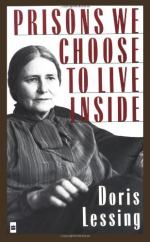
|
| Name: _________________________ | Period: ___________________ |
This test consists of 15 multiple choice questions and 5 short answer questions.
Multiple Choice Questions
1. According to Lessing, what do humans require?
(a) Free thinking.
(b) Faith.
(c) Companionship.
(d) Lots of money.
2. What, according to Lessing, is the biggest problem people in democratic societies face?
(a) Conformity.
(b) Lack of food.
(c) Oppression.
(d) Lack of money.
3. Why do most people ignore the existence of brainwashing techniques?
(a) It is too expensive for most people.
(b) They do not like the idea.
(c) It is too hard to learn.
(d) They are irritated by the idea.
4. What country did the Shah rule?
(a) Ghana.
(b) Africa.
(c) Persia.
(d) Egypt.
5. What was Margaret Thatcher's title?
(a) President of the United States.
(b) British Prime Minister.
(c) First Lady of Russia.
(d) Princess of Arabia.
6. What happened to the man who named his cat "King of Kings"?
(a) He was mocked.
(b) He was imprisoned.
(c) He was invited to a State dinner.
(d) He was lauded.
7. Concerning conformity, Lessing believed that __________had the most influence on an individual.
(a) Parents.
(b) Friends.
(c) The self.
(d) Political parties.
8. What attitude did Lessing strive for, when it came to tragedy?
(a) Rage.
(b) Dispassion.
(c) Pity.
(d) Wild emotion.
9. In Russia and Czechoslovakia, people confessed to ridiculous crimes during __________.
(a) The Show Trials.
(b) The Interest Investigation.
(c) The Scholar Trials.
(d) The No Trials.
10. In Lessing's opinion, elitism is _____________.
(a) All of these.
(b) Unfashionable.
(c) Intelligent.
(d) Snobby.
11. Lessing believed that anyone studying sects was susceptible to ______________.
(a) Believing their doctrine.
(b) Going crazy.
(c) Accusing innocent people.
(d) Not taking the study seriously.
12. What advertising firm did Margaret Thatcher hire, prior to taking a public position?
(a) Goldberg and Lessing.
(b) Saatchi & Saatchi.
(c) Shafer, Wilson and Paltrow.
(d) Greentree.
13. According to researchers, those who resist indoctrination the most are the ones very capable in what area?
(a) Negativity.
(b) Intelligence.
(c) Sanity.
(d) Humor.
14. What did Lessing believe about those living in democratic societies?
(a) They have too much money.
(b) They are individuals.
(c) They are selfish.
(d) They are not truly free.
15. What surprised people who took part in the Milgram experiment?
(a) Their need to escape.
(b) Their need for family support.
(c) Their response to authority.
(d) Their interest in psychology.
Short Answer Questions
1. Lessing considered the time period of World War II to be ___________.
2. What pseudonym did Lessing write under?
3. Who turned down Lessing's first book written under a pseudonym?
4. What are two entities which perpetuate brainwashing?
5. Through understanding brainwashing, Lessing hoped that people could let go of ___________.
|
This section contains 400 words (approx. 2 pages at 300 words per page) |

|




